German philosopher and revolutionary socialist Karl Marx published 'The Communist Manifesto' and 'Das Kapital,' anticapitalist works that form the basis of Marxism.
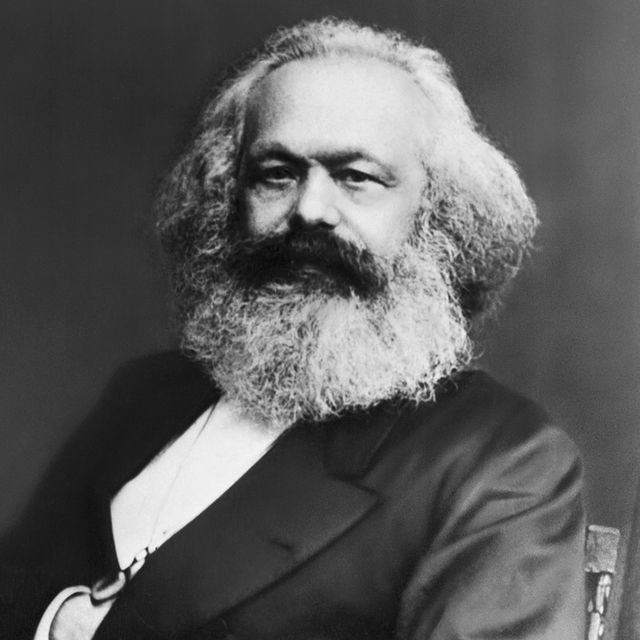
(1818-1883)

Who Was Karl Marx?
Karl Marx began exploring sociopolitical theories at university among the Young Hegelians. He became a journalist, and his socialist writings would get him expelled from Germany and France. In 1848, he published The Communist Manifesto with Friedrich Engels and was exiled to London, where he wrote the first volume of Das Kapital and lived the remainder of his life.
Karl Heinrich Marx was one of nine children born to Heinrich and Henrietta Marx in Trier, Prussia. His father was a successful lawyer who revered Kant and Voltaire, and was a passionate activist for Prussian reform. Although both parents were Jewish with rabbinical ancestry, Karl’s father converted to Christianity in 1816 at the age of 35.
This was likely a professional concession in response to an 1815 law banning Jews from high society. He was baptized a Lutheran, rather than a Catholic, which was the predominant faith in Trier, because he “equated Protestantism with intellectual freedom.” When he was 6, Karl was baptized along with the other children, but his mother waited until 1825, after her father died.
Marx was an average student. He was educated at home until he was 12 and spent five years, from 1830 to 1835, at the Jesuit high school in Trier, at that time known as the Friedrich-Wilhelm Gymnasium. The school’s principal, a friend of Marx’s father, was a liberal and a Kantian and was respected by the people of Rhineland but suspect to authorities. The school was under surveillance and was raided in 1832.
In October of 1835, Marx began studying at the University of Bonn. It had a lively and rebellious culture, and Marx enthusiastically took part in student life. In his two semesters there, he was imprisoned for drunkenness and disturbing the peace, incurred debts and participated in a duel. At the end of the year, Marx’s father insisted he enroll in the more serious University of Berlin.
In Berlin, he studied law and philosophy and was introduced to the philosophy of G.W.F. Hegel, who had been a professor at Berlin until his death in 1831. Marx was not initially enamored with Hegel, but he soon became involved with the Young Hegelians, a radical group of students including Bruno Bauer and Ludwig Feuerbach, who criticized the political and religious establishments of the day.
In 1836, as he was becoming more politically zealous, Marx was secretly engaged to Jenny von Westphalen, a sought-after woman from a respected family in Trier who was four years his senior. This, along with his increasing radicalism, caused his father angst. In a series of letters, Marx’s father expressed concerns about what he saw as his son’s “demons,” and admonished him for not taking the responsibilities of marriage seriously enough, particularly when his wife-to-be came from a higher class.
Marx did not settle down. He received his doctorate from the University of Jena in 1841, but his radical politics prevented him from procuring a teaching position. He began to work as a journalist, and in 1842, he became the editor of Rheinische Zeitung , a liberal newspaper in Cologne. Just one year later, the government ordered the newspaper’s suppression, effective April 1, 1843. Marx resigned on March 18th. Three months later, in June, he finally married Jenny von Westphalen, and in October, they moved to Paris.
Paris was the political heart of Europe in 1843. There, along with Arnold Ruge, Marx founded a political journal titled Deutsch-Französische Jahrbücher (German-French Annals). Only a single issue was published before philosophical differences between Marx and Ruge resulted in its demise, but in August of 1844, the journal brought Marx together with a contributor, Friedrich Engels, who would become his collaborator and lifelong friend. Together, the two began writing a criticism of the philosophy of Bruno Bauer, a Young Hegelian and former friend of Marx’s. The result of Marx and Engels’s first collaboration was published in 1845 as The Holy Family .
Later that year, Marx moved to Belgium after being expelled from France while writing for another radical newspaper, Vorwärts! , which had strong ties to an organization that would later become the Communist League.
In Brussels, Marx was introduced to socialism by Moses Hess, and finally broke off from the philosophy of the Young Hegelians completely. While there, he wrote The German Ideology , in which he first developed his theory on historical materialism. Marx couldn’t find a willing publisher, however, and The German Ideology -- along with Theses on Feuerbach , which was also written during this time -- were not published until after his death.
At the beginning of 1846, Marx founded a Communist Correspondence Committee in an attempt to link socialists from around Europe. Inspired by his ideas, socialists in England held a conference and formed the Communist League, and in 1847 at a Central Committee meeting in London, the organization asked Marx and Engels to write Manifest der Kommunistischen Partei (Manifesto of the Communist Party).
The Communist Manifesto, as this work is commonly known, was published in 1848, and shortly after, in 1849, Marx was expelled from Belgium. He went to France, anticipating a socialist revolution, but was deported from there as well. Prussia refused to renaturalize him, so Marx moved to London. Although Britain denied him citizenship, he remained in London until his death.
In London, Marx helped found the German Workers’ Educational Society, as well as a new headquarters for the Communist League. He continued to work as a journalist, including a 10-year stint as a correspondent for the New York Daily Tribune from 1852 to 1862, but he never earned a living wage and was largely supported by Engels.
Marx became increasingly focused on capitalism and economic theory, and in 1867, he published the first volume of Das Kapital. The rest of his life was spent writing and revising manuscripts for additional volumes, which he did not complete. The remaining two volumes were assembled and published posthumously by Engels.
Marx died of pleurisy in London on March 14, 1883. While his original grave had only a nondescript stone, the Communist Party of Great Britain erected a large tombstone, including a bust of Marx, in 1954. The stone is etched with the last line of The Communist Manifesto (“Workers of all lands unite”), as well as a quote from the Theses on Feuerbach.
QUICK FACTS
- Name: Karl Heinrich Marx
- Birth Year: 1818
- Birth date: May 5, 1818
- Birth City: Trier
- Birth Country: Germany
- Gender: Male
- Best Known For: German philosopher and revolutionary socialist Karl Marx published 'The Communist Manifesto' and 'Das Kapital,' anticapitalist works that form the basis of Marxism.
- Business and Industry
- Education and Academia
- Astrological Sign: Taurus
- University of Berlin
- University of Bonn
- Nationalities
- Death Year: 1883
- Death date: March 14, 1883
- Death City: London
- Death Country: England
We strive for accuracy and fairness. If you see something that doesn't look right, contact us !

Philosophers
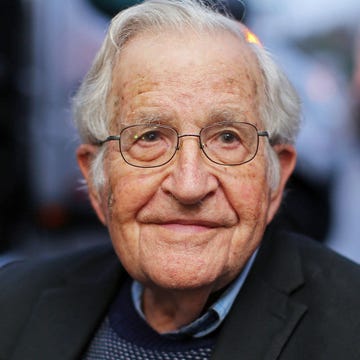
Noam Chomsky
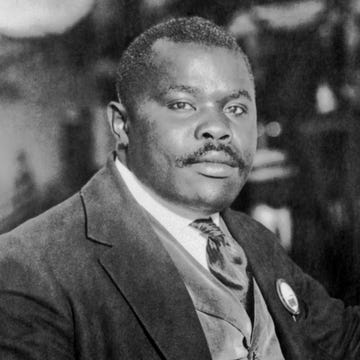
Marcus Garvey
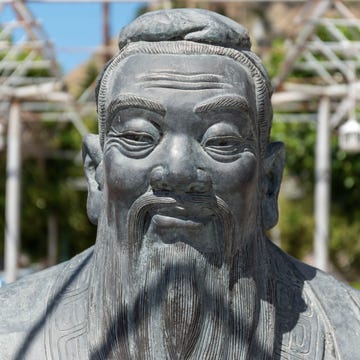
Francis Bacon
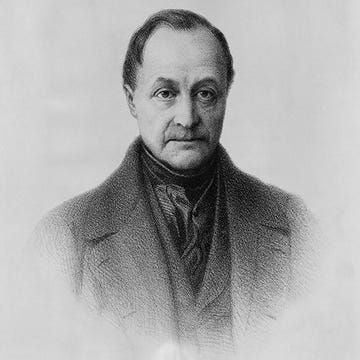
Auguste Comte
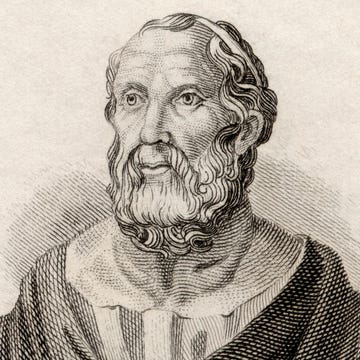
Charles-Louis de Secondat
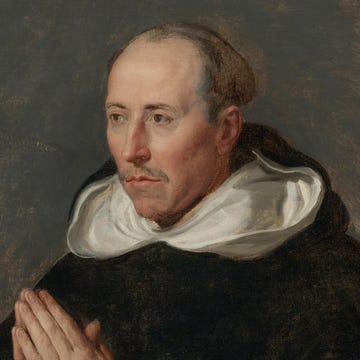
Saint Thomas Aquinas
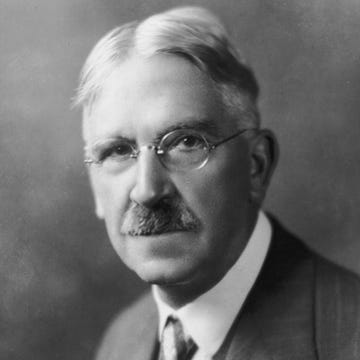
William James
10 Facts About Karl Marx

German philosopher Karl Marx (1818-1883) didn't invent communism, but he spent most of his life popularizing the socialist mantra, “from each according to his ability, to each according to his needs." Marx envisioned that the last phase of capitalism would be an inevitable workers’ revolt as the working class (or proletariat) would seize the means of production from the elites (or bourgeoisie) and share them in a new, classless society marked by economic equity. Here are 10 facts about Marx's life and work.
1. HIS BAPTISM AT AGE 6 WAS MOST LIKELY FOR POLITICAL REASONS.
Marx’s paternal ancestors had served as rabbis in Trier, Prussia (now in eastern Germany) since 1723, and his mother’s father was a rabbi. After the end of the Napoleonic Wars, the French administration left Prussia and the new government began enforcing a law barring Jews from serving in professions or public office. Marx’s father Heinrich, a successful lawyer, converted to Lutheranism in 1816, most likely in response to the law. Marx and his siblings were all baptized in 1824.
2. HIS HIGH SCHOOL WAS RAIDED BY AUTHORITIES.
Heinrich, who was deeply influenced by Enlightenment philosophers like Voltaire, taught Marx at home until 1830. Marx then attended the Friedrich-Wilhelm Gymnasium. The headmaster, Johann Hugo Wyttenbach, frequently hired liberal teachers who advocated reason and the freedom of speech. The police suspected the school of protecting revolutionaries, and even went so far as to raid the school in 1832 during Marx's matriculation.
3. HIS "WEAK CHEST" HELPED HIM AVOID MILITARY SERVICE.
Marx evaded military conscription thanks to his "weak chest," a vague diagnosis which was certainly exacerbated by his late-night partying, bad diet, drinking, and chain-smoking. His father even told him how best to avoid the draft, writing to Marx , “If you can, arrange to be given good certificates by competent and well-known physicians there, and you can do it with good conscience … but to be consistent with your conscience, do not smoke too much.”
4. A DUEL AND JAIL TIME CHARACTERIZED HIS COLLEGE EXPERIENCE.
Marx attended the University of Bonn beginning in 1835, but most of his time seems to have been spent being drunk and disorderly. He joined a radical political group called the Poets’ Club and was co-president of the Trier Tavern Club, a drinking society that antagonized the more aristocratic organizations on campus. His involvement in the latter got him tossed in jail for 24 hours. He also ran afoul of the Borussia Korps, a militant group that forced college students to swear fealty to Prussian leadership. Marx carried a gun to defend himself (which got him into more trouble with the police) and once accepted a duel with a Borussia Korps member which resulted in Marx being cut over his left eye. After a year in Bonn, he transferred to the more rigorous atmosphere of the University of Berlin.
5. HE HAD A CONTROVERSIAL MARRIAGE TO A CHILDHOOD FRIEND.
A couple of years before Marx was born, his father had befriended Ludwig von Westphalen, a Prussian aristocrat with some liberal leanings. His daughter Jenny von Westphalen met Marx when she was 5 years old and he was 1. When she was 22, Jenny and Marx became engaged—she canceled a previous engagement to a young member of the aristocracy—even though they weren’t from the same social class, and men marrying older women was frowned upon at the time in Prussia.
6. MARX DIDN’T ATTEND HIS FATHER’S FUNERAL.
Marx’s wild college years drove a wedge between him and his family—an indication of his intellectual rebellion from their bourgeois complacency. Marx refused to visit them once he began attending the University of Berlin. His father was dismayed at his son’s recklessness and wrote, a year before he died, that Marx should try to establish his social respectability by writing an ode heaping praise upon Prussia and its rulers. It should "afford the opportunity of allotting a role to the genius of the monarchy ... If executed in a patriotic and German spirit with depth of feeling, such an ode would itself be sufficient to lay the foundation for a reputation." But Marx had no desire to capitulate. When Heinrich Marx died of tuberculosis in May 1838, Karl did not make the journey home from Berlin.
7. HE RELIED ON ENGELS FOR MONEY.
Marx lived in Paris—a hotbed of political thought in the mid-19th century—for only two years, but it was during that time that he met Friedrich Engels at the Café de la Régence and launched one of the most important philosophical friendships in modern times. Engels shaped Marx’s view on the proletariat with his real-world experience as an owner of his family's textile mill. They also collaborated on several essays (including The Communist Manifesto ) and Engels fronted the money to publish Das Kapital . What’s more, Engels regularly gave the struggling Marx money for his family to live on (capitalism was not kind to the philosopher). The well-off industrialist reaped the rewards of his workers’ production while aiding Marx in championing a system that would overthrow his own power.
8. HE KEPT GETTING BANNED FROM COUNTRIES.
Orders that Marx should leave a country within 24 hours crop up regularly in his biography. He started the trend in Prussia in 1843 when Tsar Nicholas I asked the government to ban Marx’s newspaper, the Rheinische Zeitung , which caused Marx to become co-editor of a radical left newspaper in Paris and head to France. In 1845, the French government shut down his new periodical, Vorwarts! , and expelled Marx. He then went to Belgium, but authorities arrested him in 1848 on allegations that he’d spent a third of his inheritance on arming workers, and he fled back to France (then under a new government) before going back to Prussia to launch the doomed Neue Rheinische Zeitung . The government suppressed the paper and ordered Marx to leave Prussia in May 1849, but when he fled for France, the Parisian government also sent him packing, so he sought refuge in London with his wife, who was expecting their fourth child. He built a life in England, but died a stateless person.
9. HE WAS PLAGUED BY POOR HEALTH.
He referred to his health problems as “the wretchedness of existence.” According to biographer Werner Blumenberg, Marx suffered from headaches, eye inflammation, joint pain, insomnia, liver and gallbladder problems, and depressive symptoms. The pain was most likely exacerbated by Marx's bad habits: working late nights, eating liver-taxing food, and smoking and drinking excessively. Yet Marx kept up the pace of his work even after developing boils in 1863 that were so painful he couldn’t sit down. New research suggests some of Marx’s problems may have stemmed from a chronic, painful skin disease called hidradenitis suppurativa that can also cause depressed self-image and foul moods. And let's not forget the “weak chest” that kept him from serving in the military at 18, which may have been caused by pleurisy, an inflammatory condition of the lungs and thorax. It was that disease that ultimately killed him at age 64.

10. HIS LOVE POEMS AND NOVELS WERE UNPUBLISHED DURING HIS LIFETIME.
Beyond his political philosophy and economic projects, Marx also penned several love poems to Jenny, a play set in a mountain town in Italy, and a satirical novel called Scorpion and Felix . None of his fiction saw the light of day during his lifetime, and Scorpion and Felix has only survived in fragments, but all of his work was published posthumously in the 50-volume set of Marx and Engels's Collected Works .
- Science, Tech, Math ›
- Social Sciences ›
- Sociology ›
- Major Sociologists ›
A Brief Biography of Karl Marx
The Father of Communism influenced world events
- Major Sociologists
- Key Concepts
- News & Issues
- Research, Samples, and Statistics
- Recommended Reading
- Archaeology
Karl Marx (May 5, 1818–March 14, 1883), a Prussian political economist, journalist, and activist, and author of the seminal works, "The Communist Manifesto" and "Das Kapital," influenced generations of political leaders and socioeconomic thinkers. Also known as the Father of Communism, Marx's ideas gave rise to furious, bloody revolutions, ushered in the toppling of centuries-old governments, and serve as the foundation for political systems that still rule over more than 20 percent of the world's population—or one in five people on the planet. "The Columbia History of the World" called Marx's writings "one of the most remarkable and original syntheses in the history of human intellect."
The Personal Life and Education of Karl Marx
Marx was born in Trier, Prussia (present-day Germany) on May 5, 1818, to Heinrich Marx and Henrietta Pressberg. Marx's parents were Jewish, and he came from a long line of rabbis on both sides of his family. However, his father converted to Lutheranism to evade antisemitism prior to Marx's birth.
Marx was educated at home by his father until high school, and in 1835 at the age of 17, enrolled at Bonn University in Germany, where he studied law at his father's request. Marx, however, was much more interested in philosophy and literature.
Following that first year at the university, Marx became engaged to Jenny von Westphalen, an educated baroness. They would later marry in 1843. In 1836, Marx enrolled at the University of Berlin, where he soon felt at home when he joined a circle of brilliant and extreme thinkers who were challenging existing institutions and ideas, including religion, philosophy, ethics, and politics. Marx graduated with his doctoral degree in 1841.
The Career and Exile of Karl Marx
After school, Marx turned to writing and journalism to support himself. In 1842 he became the editor of the liberal Cologne newspaper "Rheinische Zeitung," but the Berlin government banned it from publication the following year. Marx left Germany—never to return—and spent two years in Paris, where he first met his collaborator, Friedrich Engels.
However, chased out of France by those in power who opposed his ideas, Marx moved to Brussels, in 1845, where he founded the German Workers’ Party and was active in the Communist League. There, Marx networked with other leftist intellectuals and activists and—together with Engels—wrote his most famous work, " The Communist Manifesto ." Published in 1848, it contained the famous line: "Workers of the world unite. You have nothing to lose but your chains." After being exiled from Belgium, Marx finally settled in London where he lived as a stateless exile for the rest of his life.
Marx worked in journalism and wrote for both German and English language publications. From 1852 to 1862, he was a correspondent for the "New York Daily Tribune," writing a total of 355 articles. He also continued writing and formulating his theories about the nature of society and how he believed it could be improved, as well as actively campaigning for socialism.
He spent the rest of his life working on a three-volume tome, "Das Kapital," which saw its first volume published in 1867. In this work, Marx aimed to explain the economic impact of capitalist society, where a small group, which he called the bourgeoisie, owned the means of production and used their power to exploit the proletariat, the working class that actually produced the goods that enriched the capitalist tsars. Engels edited and published the second and third volumes of "Das Kapital" shortly after Marx's death.
The Death and Legacy of Karl Marx
While Marx remained a relatively unknown figure in his own lifetime, his ideas and the ideology of Marxism began to exert a major influence on socialist movements shortly after his death. He succumbed to cancer on March 14, 1883, and was buried in Highgate Cemetery in London.
Marx's theories about society, economics, and politics, which are collectively known as Marxism, argue that all society progresses through the dialectic of class struggle. He was critical of the current socio-economic form of society, capitalism, which he called the dictatorship of the bourgeoisie, believing it to be run by the wealthy middle and upper classes purely for their own benefit, and predicted that it would inevitably produce internal tensions which would lead to its self-destruction and replacement by a new system, socialism.
Under socialism, he argued that society would be governed by the working class in what he called the "dictatorship of the proletariat." He believed that socialism would eventually be replaced by a stateless, classless society called communism .
The Continuing Influence of Karl Marx
Whether Marx intended for the proletariat to rise up and foment revolution or whether he felt that the ideals of communism, ruled by an egalitarian proletariat, would simply outlast capitalism, is debated to this day. But, several successful revolutions did occur, propelled by groups that adopted communism —including those in Russia, 1917-1919 , and China, 1945-1948. Flags and banners depicting Vladimir Lenin, the leader of the Russian Revolution, together with Marx, were long displayed in the Soviet Union . The same was true in China, where similar flags showing the leader of that country's revolution, Mao Zedong , together with Marx were also prominently displayed.
Marx has been described as one of the most influential figures in human history, and in a 1999 BBC poll was voted the "thinker of the millennium" by people from around the world. The memorial at his grave is always covered by tokens of appreciation from his fans. His tombstone is inscribed with words that echo those from "The Communist Manifesto," which seemingly predicted the influence Marx would have on world politics and economics: "Workers of all lands unite.”
- Max Weber's Key Contributions to Sociology
- Famous Sociologists
- Karl Marx's Greatest Hits
- A Brief Biography of Pierre Bourdieu
- Who Was Sociologist Georg Simmel?
- Biography of Max Weber
- Biography of Antonio Gramsci
- Max Weber's Three Biggest Contributions to Sociology
- Biography of Herbert Spencer
- How W.E.B. Du Bois Made His Mark on Sociology
- 11 Black Scholars and Intellectuals Who Influenced Sociology
- Sociologist Michel Foucault
- The Life of Talcott Parsons and His Influence on Sociology
- Juergen Habermas
- 5 Superstar Women Sociologists You Should Know
- A Brief Overview of Émile Durkheim and His Historic Role in Sociology
- World Biography
Karl Marx Biography
Born: May 5, 1818 Trier, Germany (formerly in Rhenish Prussia) Died: March 14, 1883 London, England German philosopher and political leader
The German philosopher, revolutionary economist (one who studies the use of money and other material funds), and leader Karl Marx founded modern "scientific" socialism (a system of society in which no property is held as private). His basic ideas—known as Marxism—form the foundation of Socialist and Communist (an economic and government system characterized by citizens holding all property and goods in common) movements throughout the world.
Karl Heinreich Marx was born in Trier, Rhenish Prussia (present-day Germany), on May 5, 1818, the son of Heinrich Marx, a lawyer, and Henriette Presburg Marx, a Dutchwoman. Both Heinrich and Henriette were descendants of a long line of rabbis (masters or teachers of Jewish religion). Barred from the practice of law because he was Jewish, Heinrich Marx converted to Lutheranism about 1817. Karl was baptized in the same church in 1824 at the age of six. Karl attended a Lutheran elementary school but later became an atheist (one who does not believe in the existence of God) and a materialist (one who believes that physical matter is all that is real), rejecting both the Christian and Jewish religions. It was he who coined the saying "Religion is the opium [drug that deadens pain, is today illegal, and comes from the poppy flower] of the people," a basic principle in modern communism.
Karl attended the Friedrich Wilhelm Gymnasium in Trier for five years, graduating in 1835 at the age of seventeen. The gymnasium's program was the usual classical one—history, mathematics, literature, and languages, particularly Greek and Latin. Karl became very skillful in French and Latin, both of which he learned to read and write fluently. In later years he taught himself other languages, so that as a mature scholar he could also read Spanish, Italian, Dutch, Scandinavian, Russian, and English. As his articles in the New York Daily Tribune show, he came to handle the English language masterfully (he loved Shakespeare [1564–1616], whose works he knew by heart), although he never lost his heavy German accent when speaking.
Young adult years
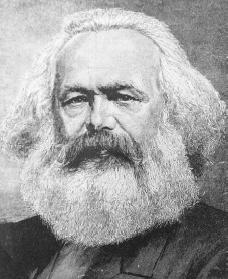
Marx's dismayed father took him out of Bonn and had him enter the University of Berlin, then a center of intellectual discussion. In Berlin a circle of brilliant thinkers was challenging existing institutions and ideas, including religion, philosophy, ethics (the study of good and bad involving morals), and politics. Marx joined this group of radical (extreme in opinion) thinkers wholeheartedly. He spent more than four years in Berlin, completing his studies with a doctoral degree in March 1841.
Forced to move on
Marx then turned to writing and journalism to support himself. In 1842 he became editor of the liberal (open to new ideas) Cologne newspaper Rheinische Zeitung, but the Berlin government prohibited it from being published the following year. In January 1845 Marx was expelled from France "at the instigation [order] of the Prussian government," as he said. He moved to Brussels, Belgium, where he founded the German Workers' Party and was active in the Communist League. Here he wrote the famous Manifesto of the Communist Party (known as the Communist Manifesto ). Expelled (forced out) by the Belgian government, Marx moved back to Cologne, where he became editor of the Neue Rheinische Zeitung in June 1848. Less than a year later, the Prussian government stopped the paper, and Marx himself was exiled (forced to leave). He went to Paris, but in September the French government expelled him again. Marx finally settled in London, England, where he lived as a stateless exile (Britain denied him citizenship and Prussia refused to take him back as a citizen) for the rest of his life.
In London Marx's sole means of support was journalism. He wrote for both German-and English-language publications. From August 1852 to March 1862 he was correspondent for the New York Daily Tribune, contributing a total of about 355 articles. Journalism, however, paid very poorly; Marx was literally saved from starvation by the financial support of friend and fellow writer, Friedrich Engels (1820–1895). In London in 1864 Marx helped to found the International Workingmen's Association (known as the First International), for which he wrote the inaugural (opening) address. Thereafter Marx's political activities were limited mainly to exchanging letters with radicals in Europe and America, offering advice, and helping to shape the socialist and labor movements.
Personal life
Marx was married to his childhood sweetheart, Jenny von Westphalen, who was known as the "most beautiful girl in Trier," on June 19, 1843. She was totally devoted to him. She died of cancer on December 2, 1881, at the age of sixty-seven. For Marx it was a blow from which he never recovered.
The Marxes had seven children, four of whom died in infancy or childhood. He deeply loved his daughters, who, in turn, adored him. Of the three surviving daughters—Jenny, Laura, and Eleanor—two married Frenchmen. Both of Marx's sons-in-law became prominent French socialists and members of Parliament. Eleanor was active as a British labor organizer.
Marx spent most of his working time in the British Museum, doing research both for his newspaper articles and his books. In preparation for Das Kapital, he read every available work in economic and financial theory and practice.
Marx's excessive smoking, wine drinking, and love of heavily spiced foods may have been contributing causes to his illnesses. In the final dozen years of his life, he could no longer do any continuous intellectual work. He died in his armchair in London on March 14, 1883, about two months before his sixty-fifth birthday. He lies buried in London's Highgate Cemetery, where his grave is marked by a bust (sculpture of a person's head and shoulders) of him.
Marxism achieved its first great triumph in the Russian Revolution (1917–21; when the lower class overthrew three hundred years of czar rule), when its successful leader, Vladimir Ilich Lenin (1870–1924), a lifelong follower of Marx, organized the Soviet Union as a proletarian dictatorship (country ruled by the lower class). Lenin based the new government on Marx's philosophy as Lenin interpreted it. Thus, Marx became a world figure and his theories became a subject of universal attention and controversy (open to dispute). Marx wrote hundreds of articles, brochures, and reports, but only five books.
Marx's universal appeal lies in his moral approach to socio-economic problems, in his insights into the relationships between institutions and values, and in his ideas about the salvation (to save from destruction) of mankind. Hence Marx is best understood if one studies not only his economics, but also his theory of history and politics. The central idea in Marx's thought involves two basic notions: that the economic system at any given time determines the current ideas; and that history is an ongoing process keeping up with the economic institutions that change in regular stages.
To Marx, capitalism (an economic system characterized by private or corporate ownership of goods) was the last stage of historical development before communism. The lowest social or economic class of a community, when produced by capitalism, is the last historical class. The two are fated to be in conflict—the class struggle, which Marx wrote of in the Communist Manifesto —until the lower class inevitably wins. The proletarian dictatorship, in turn, develops into communism, in which there are no classes and no inequalities. The logical suggestion is that with the final establishment of communism, history comes to a sudden end. This Marxist interpretation has been criticized in the noncommunist world as historically inaccurate, scientifically weak, and logically ridiculous. Nevertheless, Marx's message of an earthly paradise (a classless society) has provided millions with hope and a new meaning of life. From this point of view, one may agree with the Austrian economist Joseph A. Schumpeter that "Marxism is a religion" and Marx is its "prophet."
For More Information
Manuel, Frank Edward. A Requiem for Karl Marx. Cambridge, MA: Harvard University Press, 1995.
Strathern, Paul. Marx in 90 Minutes. Chicago: Ivan R. Dee, 2001.
Wheen, Francis. Karl Marx: A Life. New York: Norton, 2000.
User Contributions:
Comment about this article, ask questions, or add new information about this topic:.
Famous Philosophers
Biography, Facts and Works

Karl Heinrich Marx was a revolutionary German philosopher, who created a strong impact in the world through economics and politics. He played a major role in shaping much of the modern economic school of thought through laying the basis of concept of labor and relating it with capital. Among his numerous published works, the Communist Manifesto and Das Kapital are the most noteworthy.
The collective theories of Karl Marx, known as ‘Marxism’ holds the idea that the struggle between the classes is the cause of progress in a society. He stood against the exploitation of the working class by the capitalist factory and land owners. His strong views and ideas were manifested in communism and socialism, the two revolutionary theories which affected the world both socioeconomically and politically.
Marx was of the views that the change in human history was caused by altering human nature, involving both the human beings and material things. He assumed that a human has two forms, the actual self and a potential self. Self-development is a process which initiates through the realization that actual self deems the potential self as an object to be improved. Marx debated that the subjective self actualizes the human being by taking the object as its own. Thus, for Marx, human nature was a function of human labor, which he called the ‘species-being’. For the subject to affect the object, it must first have some form of influence on the material world around the subject.
‘Historical Materialism’ is Marx’s philosophy of history, according to which a person should view history dialectically, viewing the changes in material conditions as the means of influence on the society. His views were based on those of Hegel, but differed from his as Marx based dialectics not on ideas like Hegel, but on material.
In his publication, ‘Economic and Political manuscript of 1844’ , Marx has laid the foundation of his economic analysis. In ‘The Condition of the Working Class in England’, ‘Communist Manifesto’, and ‘Das Kapital’ his views against capitalism found clear expression. Published in collaboration with his colleague Friedrich Engels , Marx differentiated communism from numerous other socialist movements in these books. He presented the struggle of the working class under the rule of the bourgeoisie and gave ideas for social reorganization and unification of the proletariat against capitalists.
Observing the worsening conditions of the working class, their long and tedious hours and unsafe environment in the factories, Marx reacted to the capitalist system. He presented an alternative solution, called ‘Communism’, according to which the bourgeoisie will not be able to hold any lands or factories; all means of production will be owned by the government. All the people will work together for the government and the resulting wealth will be distributed among them according to their needs, and not their efforts, thus leading to a classless society.
Even though his ideas were largely inspired by the French school of thought of Socialism, he openly criticized all idealistic socialists. He was a revolutionary man, expressing the thoughts that minute socialist groups will succumb to nothingness, without causing significant change in society. He aspired for a grand change in the economic system of his era through an all-encompassing socialist community.
Karl Marx proved to be one of the three most important people who created an impact on the modern social sciences, the other being Max Weber and Emile Durkheim . Various governments in the 20th century laid their foundations on ideas of socialism and communism presented by Marx, such as the People’s Republic of China (1949) and the Soviet Union (1922). Marxism also inspired numerous theories, like Stalinism, Maoism and Leninism.
Buy books by Karl Marx

- John Searle
- John Stuart Mill
- Jonathan Edwards
- Judith Butler
- Julia Kristeva
- Jürgen Habermas
- Karl Jaspers
- Lucien Goldmann
- Ludwig Wittgenstein
- Marcus Aurelius
- Mario Bunge
- Martha Nussbaum
- Martin Buber
- Martin Heidegger
- Mary Wollstonecraft
- Max Scheler
- Max Stirner
- Meister Eckhart
- Michel Foucault
- Miguel De Unamuno
- Niccolò Machiavelli
- Nick Bostrom
- Noam Chomsky
- Peter Singer
- René Descartes
- Robert Nozick
- Roland Barthes
- Rosa Luxemburg
- Rudolf Steiner
- Sigmund Freud
- Simone De Beauvoir
- Simone Weil
- Søren Kierkegaard
- Theodor Adorno
- Thomas Aquinas
- Thomas Hobbes
- Thomas Jefferson
- Thomas Kühn
- U.G. Krishnamurti
- Walter Benjamin
- Wilhelm Reich
- William James
- William Lane Craig
- Alain de Benoist
- Alan Turing
- Albert Camus
- Albertus Magnus
- Arthur Schopenhauer
- Auguste Comte
- Baruch Spinoza
- Bertrand Russell
- Cesare Beccaria
- Charles Sanders Peirce
- Daniel Dennett
- Edmund Burke
- Edmund Husserl
- Emile Durkheim
- Emma Goldman
- Francis Bacon
- Friedrich Engels
- Friedrich Hayek
- Friedrich Nietzsche
- George Berkeley
- George Herbert Mead
- George Santayana
- Georges Bataille
- Gilles Deleuze
- Giordano Bruno
- Gottfried Leibniz
- Hannah Arendt
- Henry David Thoreau
- Hildegard Of Bingen
- Immanuel Kant
- Iris Murdoch
- Jacques Derrida
- Jacques Lacan
- Jean Baudrillard
- Jean Jacques Rousseau
- Jean-Paul Sartre
- Jeremy Bentham
- Jiddu Krishnamurti

IMAGES
VIDEO
COMMENTS
QUICK FACTS. Name: Karl Heinrich Marx; Birth Year: 1818; Birth date: May 5, 1818
Karl Marx (born May 5, 1818, Trier, Rhine province, Prussia [Germany]—died March 14, 1883, London, England) was a revolutionary, sociologist, historian, and economist.He published (with Friedrich Engels) Manifest der Kommunistischen Partei (1848), commonly known as The Communist Manifesto, the most celebrated pamphlet in the history of the socialist movement.
German philosopher Karl Marx (1818-1883) didn't invent communism, but he spent most of his life popularizing the socialist mantra, "from each according to his ability, to each according to his ...
The Personal Life and Education of Karl Marx . Marx was born in Trier, Prussia (present-day Germany) on May 5, 1818, to Heinrich Marx and Henrietta Pressberg. Marx's parents were Jewish, and he came from a long line of rabbis on both sides of his family. However, his father converted to Lutheranism to evade antisemitism prior to Marx's birth.
Karl Marx [a] (German: [kaʁl ˈmaʁks]; 5 May 1818 - 14 March 1883) was a German-born philosopher, political theorist, economist, historian, sociologist, journalist, and revolutionary socialist.His best-known works are the 1848 pamphlet The Communist Manifesto (with Friedrich Engels) and his three-volume Das Kapital (1867-1894); the latter employs his critical approach of historical ...
Karl Marx was a 19th-century philosopher, political economist, and revolutionary, who gave socialism a scientific foundation. Marx was devoted to the study of philosophy and history from a young age and was about to become an assistant professor in philosophy before his life took a different direction and he became a revolutionary. From a very ...
Karl Heinreich Marx was born in Trier, Rhenish Prussia (present-day Germany), on May 5, 1818, the son of Heinrich Marx, a lawyer, and Henriette Presburg Marx, a Dutchwoman. Both Heinrich and Henriette were descendants of a long line of rabbis (masters or teachers of Jewish religion).
Karl Marx (1818-1883) was a German philosopher, economist, and a revolutionist. His writings form the main basis of the body of ideas known as Marxism. Along with his friend, Friedrich Engels, Mark created the theory of modern communalism and socialism. Early Life of Karl Marx. Karl Marx was born in Trier, Germany, in 1818.
Karl Marx, revolutionary, socialist, historian, and economist who, with Friedrich Engels, wrote the works, including Manifest der Kommunistischen Partei (The Communist Manifesto) and Das Kapital, that formed the basis of communism. Learn more about Karl Marx and his life, beliefs, and writings here.
Karl Marx proved to be one of the three most important people who created an impact on the modern social sciences, the other being Max Weber and Emile Durkheim. Various governments in the 20th century laid their foundations on ideas of socialism and communism presented by Marx, such as the People's Republic of China (1949) and the Soviet ...